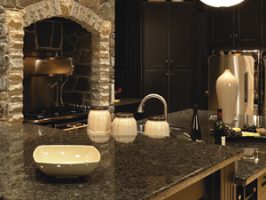Kitchen countertops, bathroom vanity tops, bar tops, and the like are especially prone to staining because they are exposed to oily or dye-containing substances on a daily, or sometimes, even an hourly basis. Consequently, a sealer may need to be applied to inhibit staining. Choosing the correct type of sealer can be very important for how the sealer performs. An experienced, professional countertop fabricator will know which sealer is best, taking into consideration the characteristics of the particular type of stone to which it will be applied and the location where the stone is used.
Impregnating Sealers
Impregnating sealers, also known as penetrating sealers, are the most commonly used sealers. Applied to natural stone to inhibit staining, impregnating sealers penetrate below the surface and protect the stone from within. They are formulated with water-repellent and oil-repellent substances. Topical sealers are available, but can be problematic, and in most cases, they are not recommended.
Misconceptions About Sealers
There are many misconceptions about what a sealer does and doesn't do. It is important to note that sealers do not prevent traffic patterns or etching. The surface of the stone is still vulnerable to acidic substances, scratches, dullness, and other damage. In addition, natural stone, even when it is properly sealed, is not stain proof, it is merely stain resistant. In other words, it buys some time so that spills can be cleaned before they penetrate into the stone and become stains. After natural stone is sealed, it still needs to be regularly cleaned with pH neutral stone care products and periodically refinished.
New High Performance Protective Treatments
There are new protective treatments that, unlike impregnating sealers, offer both etch and stain protection.
Ask us about how we can protect your natural stone.
This is one of a series of articles written and published on behalf of Surface Care PRO Partners.

